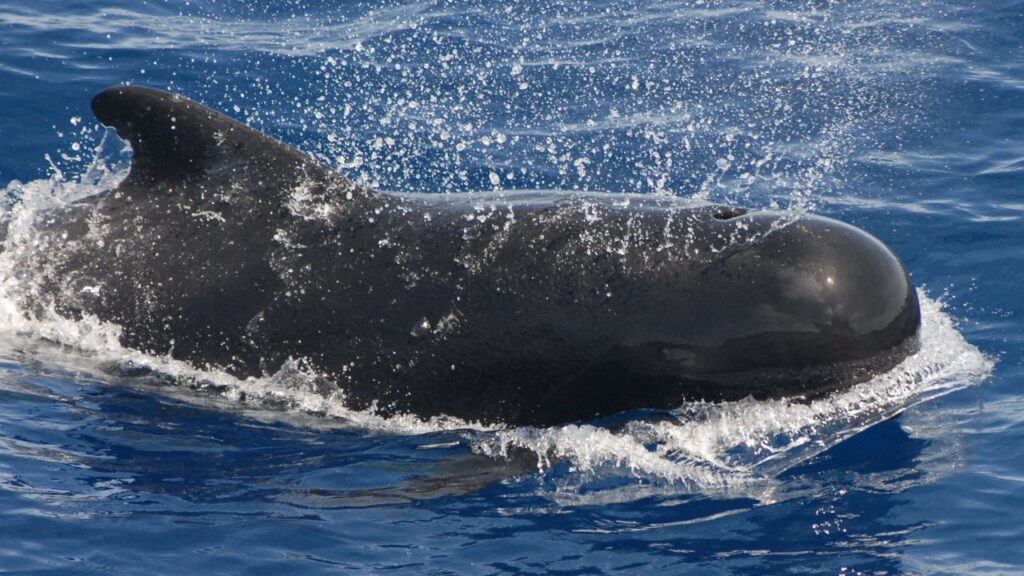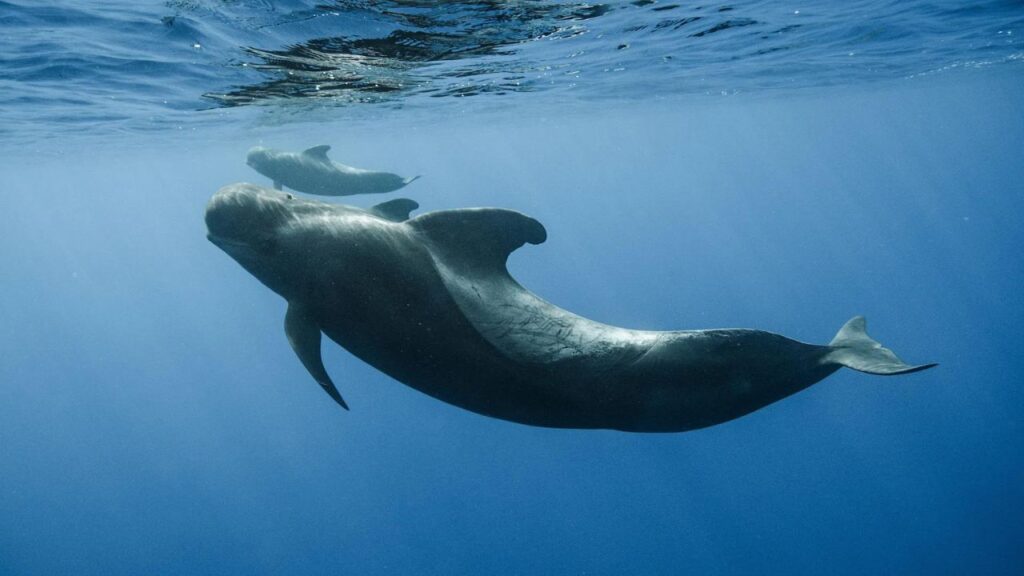Do Pilot Whales Attack Humans? There are no documented cases of pilot whales attacking humans in the wild. However, interactions with pilot whales are generally peaceful unless provoked or threatened.
Pilot whales are captivating creatures that have intrigued marine biologists, divers, and nature enthusiasts alike.
Their intelligence, social behavior, and tendency to strand in large numbers have made them the focus of much research and curiosity.
Despite their size and power, many people wonder whether pilot whales pose any danger to humans.
Questions about potential attacks by marine animals are common, especially in the case of large species like pilot whales, which can weigh several tons.
This article delves into the behavior of pilot whales to answer the pressing question: Do pilot whales attack humans?
We’ll explore their temperament, their interactions with humans in both the wild and captivity, and the rare accidental incidents that have occurred.
Furthermore, we will discuss their fascinating mass stranding behavior, their conservation status, and why they are often misunderstood.
Contents
What Are Pilot Whales?
Species Overview
Pilot whales, part of the dolphin family, are among the largest species of oceanic dolphins. There are two primary species: short-finned pilot whales and long-finned pilot whales.
Both species are characterized by their large, rounded heads and dark-colored bodies. [Do Pilot Whales Attack Humans?]
Adult pilot whales can grow between 13 to 20 feet long and weigh up to 3 tons, making them one of the ocean’s most impressive creatures. These whales are predominantly found in deep, offshore waters.
Short-finned pilot whales inhabit tropical and subtropical regions, while long-finned pilot whales are typically found in cooler waters. Their range is extensive, covering oceans around the world.
Behavior and Social Structure
Pilot whales are highly social animals, often living in pods ranging from 10 to 50 individuals, though superpods of up to 1,000 whales have been documented. Their social bonds are strong, with individuals showing deep loyalty to their groups.
They are known to engage in complex communication, utilizing a variety of vocalizations, including clicks and whistles, to communicate with one another.
These whales often travel in matrilineal groups, meaning the pod is led by females, and many members are related. [Do Pilot Whales Attack Humans?]
Their social structure is one of the most intricate among marine mammals, which might explain their close-knit behavior during strandings.

Do Pilot Whales Attack Humans?
General Temperament
Despite their size, pilot whales are not aggressive toward humans. They are, in fact, known for their gentle and inquisitive nature.
Divers and marine biologists who have encountered them in the wild describe pilot whales as curious but non-threatening. [Do Pilot Whales Attack Humans?]
They often approach boats out of curiosity, sometimes even swimming alongside them for miles. These encounters are generally peaceful, with the whales showing no sign of aggression.
Interactions with Humans
Pilot whales’ interactions with humans are mostly limited to curious encounters in the wild. Scuba divers and snorkelers have reported being approached by these animals in a non-threatening manner.
In many cases, pilot whales appear to be investigating their human visitors, possibly mistaking them for other marine creatures or simply showing interest in their unusual appearance. [Do Pilot Whales Attack Humans?]
There are countless stories of peaceful interactions between pilot whales and humans.
For example, researchers studying pilot whales off the coast of the Canary Islands have noted the whales’ tendency to approach boats and even follow them for extended periods, seemingly out of curiosity.
In these interactions, the whales display no signs of aggression and often seem just as interested in humans as humans are in them.
Accidental Incidents
While pilot whales are not inherently dangerous, there have been rare cases where humans were accidentally harmed during interactions.
Such incidents often occur in situations where humans and pilot whales come into close contact, such as during boat collisions or strandings.
Pilot whales are large and powerful animals, and accidental injury can occur when they move quickly or unpredictably, especially in shallow waters where they may feel trapped or distressed.
For example, during a mass stranding event, rescuers trying to aid the whales may accidentally be harmed by the flailing movements of a stranded whale. It’s important to note that these incidents are rare and are almost always unintentional.
Risks in Captivity
The behavior of marine animals in captivity can sometimes differ significantly from their behavior in the wild. [Do Pilot Whales Attack Humans?]
While pilot whales are not commonly held in captivity, there have been isolated instances where captive whales displayed signs of stress or frustration.
In such environments, confined spaces and lack of socialization can sometimes lead to behavioral changes. However, pilot whales in the wild are typically non-aggressive and peaceful in nature.
Instances of marine animals in captivity acting out of stress have been reported with other species, such as orcas, but these are not reflective of the species’ behavior in the wild.
For pilot whales, captivity does not bring out aggression, but it can lead to frustration if they are kept in unsuitable conditions.
Provoked Aggression
As with any wild animal, there is always a possibility of defensive behavior if pilot whales feel threatened.
While they do not attack humans without provocation, pilot whales may become defensive if they perceive a threat to themselves or their pod.
For instance, if a human tries to interfere with their pod or get too close, the whales might respond defensively, although this is extremely rare.
Wild animals, including marine mammals, rely on their instincts to protect themselves and their group members. [Do Pilot Whales Attack Humans?]
People need to respect the boundaries of wild animals and avoid actions that could provoke defensive behavior.

Why Do Pilot Whales Strand Themselves?
Mass Strandings
One of the more perplexing behaviors exhibited by pilot whales is their tendency to strand themselves en masse on beaches.
This phenomenon, known as mass strandings, can involve dozens or even hundreds of whales becoming beached at the same time.
Such events have been recorded for centuries, and they often result in the death of many of the stranded whales. [Do Pilot Whales Attack Humans?]
Pilot whales are one of the most frequent cetacean species to mass strand, and these events often draw significant media attention and public concern.
When a stranding occurs, large teams of rescuers, both professionals and volunteers, mobilize to try to save the whales.
However, despite these efforts, many stranded whales do not survive due to the physiological stress of being out of the water.
Possible Causes
The reasons for mass strandings remain a mystery, though several theories have been proposed. [Do Pilot Whales Attack Humans?]
One theory suggests that pilot whales may strand themselves due to navigational errors caused by changes in the earth’s magnetic field.
Pilot whales, like many marine animals, may use the earth’s magnetic field to navigate, and disruptions to this field could lead them into shallow waters.
Another theory suggests that sickness or injury within a pod may lead to a mass stranding. Since pilot whales have such strong social bonds, they tend to follow one another, even if one individual is in distress.
If a sick or injured whale heads toward shore, the rest of the pod may follow, resulting in a mass stranding event. [Do Pilot Whales Attack Humans?]
Human Role in Strandings
When pilot whales strand themselves, humans often play a crucial role in rescue efforts. Teams of rescuers attempt to refloat the whales and guide them back to deeper waters. However, these rescue operations are fraught with challenges.
The size and weight of pilot whales make them difficult to move, and the stress of being stranded often causes them to be disoriented and exhausted.
Despite the best efforts of rescuers, mass strandings often result in significant mortality. However, the dedication of volunteers and professionals alike has saved many whales from certain death in these tragic events.
Are Pilot Whales Endangered?
Conservation Status
Pilot whales are not currently classified as endangered, but their conservation status varies by region. [Do Pilot Whales Attack Humans?]
The short-finned pilot whale, which inhabits warmer waters, is considered of “least concern” by the International Union for Conservation of Nature (IUCN).
However, some populations of long-finned pilot whales, particularly in the Southern Hemisphere, are more vulnerable due to human activities and environmental changes.
Threats to Pilot Whales
Pilot whales face several threats in their natural habitats. One of the primary dangers is entanglement in fishing gear, particularly in long-line fisheries and driftnets. When whales become entangled in these nets, they can suffer severe injuries or drown.
Pollution, including plastic debris and chemical contaminants, also poses a significant threat to the health of pilot whale populations. [Do Pilot Whales Attack Humans?]
Additionally, in some regions, pilot whales are still hunted for their meat and oil. While this practice has decreased in recent years due to international conservation efforts, it continues in certain areas, particularly in the Faroe Islands.
These hunts have drawn criticism from animal rights activists and conservationists, who argue that the practice is both inhumane and unsustainable.
Conservation Efforts
Conservation efforts aimed at protecting pilot whales focus on reducing the impact of human activities on their populations. [Do Pilot Whales Attack Humans?]
These efforts include promoting sustainable fishing practices, reducing plastic pollution in the oceans, and advocating for the protection of whale habitats.
Organizations such as the Whale and Dolphin Conservation (WDC) work tirelessly to raise awareness about the threats facing pilot whales and other marine mammals.
Public awareness campaigns and legal protections, such as the Marine Mammal Protection Act in the United States, have also contributed to the conservation of pilot whales.
However, continued efforts are needed to ensure that these majestic animals are protected for future generations. [Do Pilot Whales Attack Humans?]
Final Verdict
In conclusion, pilot whales are not a threat to humans. These gentle and social creatures are more likely to approach out of curiosity than aggression.
While rare accidental incidents can occur, they are typically unintentional and result from human interference or proximity.
Pilot whales are peaceful by nature, and respecting their space ensures safe and enjoyable interactions. [Do Pilot Whales Attack Humans?]
As with all wildlife, it’s essential to approach these creatures with caution and respect.
By understanding and appreciating their behavior, we can ensure that both humans and whales can coexist harmoniously in the ocean’s vast ecosystem.
See Also: Do Giraffes Attack Humans? Kicks of Fury
FAQs
Are pilot whales friendly toward humans?
Yes, pilot whales are generally curious and friendly toward humans, often approaching boats out of curiosity.
Have there been any cases of pilot whales attacking humans?
There arenno documented cases of pilot whales intentionally attacking humans. [Do Pilot Whales Attack Humans?]
How do pilot whales typically behave around boats?
Pilot whales may swim alongside boats or approach them out of curiosity, but they rarely display aggression.
Why do pilot whales strand themselves?
Mass strandings are thought to be caused by factors such as navigational errors, sickness, or environmental changes, though the exact reasons remain unclear.
What should you do if you encounter a pilot whale in the wild?
It’s best to observe from a distance, avoid making sudden movements, and never try to interact with or touch the whales.
Conclusion: Do Pilot Whales Attack Humans?
Pilot whales are incredible animals, known for their intelligence, social bonds, and peaceful nature.
Despite their large size, they pose no significant threat to humans, and interactions with them are typically positive and awe-inspiring.
However, it’s crucial to respect their space and avoid actions that could cause them distress. By promoting conservation and understanding, we can continue to enjoy these majestic creatures in their natural habitats while protecting them for generations to come.
With their gentle demeanor and complex social structure, pilot whales are a reminder of the beauty and intricacy of marine life.
These animals deserve our admiration, respect, and protection as we strive to coexist with the incredible biodiversity of the ocean. [Do Pilot Whales Attack Humans?]

Hello, I am Rosa Ellis, a mother of two and a wildlife blogger. I grew up in New York City, but I love exploring forests. I’ve traveled to places like Yellowstone National Park and the Amazon Rainforest to see animals up close. I know a lot about animal behavior and which animals can be dangerous to humans. Thanks for visiting my blog!

